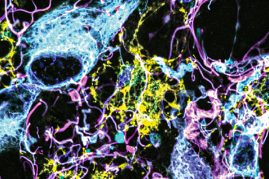
Synthetic Biology
Synthetic biology re-engineers and composes core biological processes in new ways to create living systems that address energy, environment, and medicine.
Types of Research
This research area involves the design and engineering of biological systems that can perform complex tasks, such as producing specific molecules, sensing environmental signals, and responding to changes in the environment. Synthetic biology typically involves the manipulation of DNA, RNA, and proteins, as well as the construction of new genetic circuits and the use of computational models to predict and optimize the behavior of biological systems. Researchers in this field work to develop new tools and technologies for genetic engineering, with the goal of creating new biological systems that can be used for a range of applications, such as biotechnology, medicine, and environmental monitoring.
Focus Areas
- Synthesis of genes and genomes
- Design of genetic circuits
- Design of customized metabolic pathways

Related Faculty
Spotlight

